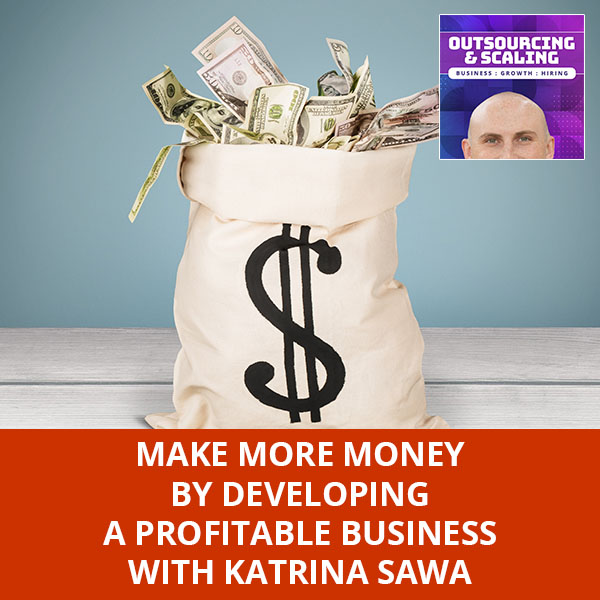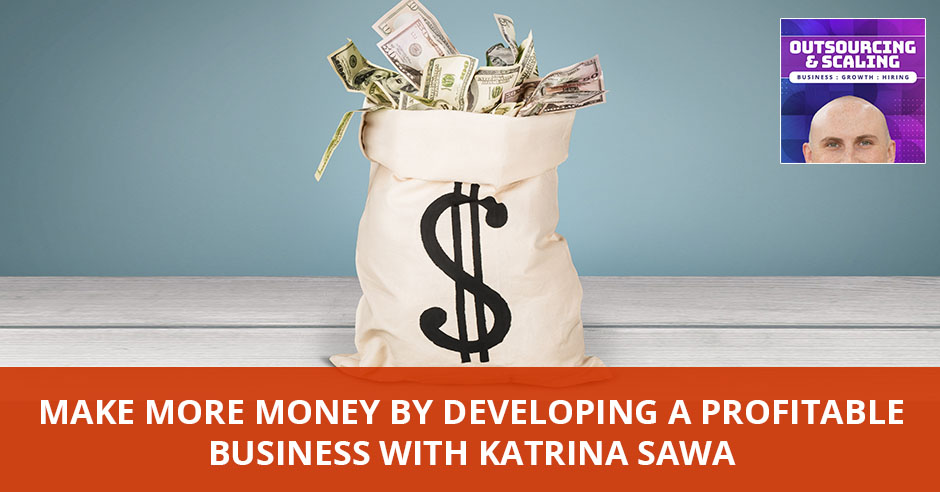


Are you trying to figure out how to make more money and get more clients? In today’s episode, host Nathan Hirsch talks with the Creator of Jumpstart Your Marketing System and the JumpStart Your Biz Coach, Katrina Sawa, on how she helps entrepreneurs make more money doing what they love fast. With her expertise and knowledge about business, she dives deeper into discussing how to develop profitable businesses consistently, giving some helpful tips and tricks on implementing proven marketing and business strategies. Join Katrina Sawa as she imparts her knowledge and expertise to help you make more money and take your business strategies to the next level.
—
Listen to the podcast here:
[smart_track_player url=”https://www.podetize.com/statsapi/www.podetize.com/wp-content/uploads/fileuploads/11-5b145ef137b51b3d1af0633e9305c43d/11/2019/c4d925901fa65266756b80b26f5abfde.mp3″ title=”Make More Money By Developing A Profitable Business With Katrina Sawa” artist=”Nathan Hirsch” image=”https://freeup.net/wp-content/uploads/2019/04/OAS.png” ]
Download the audio file here.
Make More Money By Developing A Profitable Business With Katrina Sawa
My guest is, Katrina Sawa. Katrina, how are you doing?
I’m great. Thanks for having me.
Thanks for being here. She is the JumpStart Your Business Coach because she helps entrepreneurs make more money doing what they love and fast. She’s the Creator of JumpStart Your Marketing System. A tell-it-like-it-is speaker and international bestseller author of books Love Yourself Successful, JumpStart Your New Business Now and Jumpstart Your _____. Katrina has a no-nonsense approach to showing entrepreneurs how to develop consistently profitable businesses, implementing proven marketing and business strategies. Plus, she kicks you in the butt when you need it to get it all done with over 30 years of sales, business and marketing experience. We are excited to talk to you all about that. I know you have a lot to share about follow-up. We’re going to talk all about that. First, let’s take a gigantic step back. What were you like growing up? Were you a straight-A student? Were you a rebel? Did you always know that you wanted to be an entrepreneur?
I didn’t. My family was very much onto employee mindset. They were all PhDs, professors and Master’s degree type people. I didn’t like school. I was getting through as much as I need to do and then I’ll get a job. I was given the gift of sales and marketing. You have to learn a lot of this stuff, but some people are born with the ability to talk to people and have those kinds of words come out of their mouth easier than others. That was a huge gift for me growing up. I was able to negotiate all things through high school and college. When I got out of college, I was a bartender. I graduated college.
My mom was so proud and I’m like, “Do I have to go into corporate?” I know I was meant for something different. I stumbled across a business and marketing coaching after leaving a job that I hated. I said, “I’m never going back. I’m going to make this work.” I leaked out. Luckily, I’d already made a lot of connections in the community. That’s what it’s about. It’s by making connections, whether it’s online communities or in-person communities. That’s what made it because I was good in the community and the chambers and businesses and stuff. It was pretty easy to launch out and say, “Now, can I do this for you? This is how much I charge.”
Talk to me about your first entrepreneurial endeavor, not mowing lawns or baseball cards, the first real-world entrepreneur endeavor. Who did you hire and how did that go?
I’ve never had a business until I left my corporate job. I’ve made door-to-door sales. It’s because I was a contractor. If I didn’t knock on doors, then I wouldn’t make any money. In a sense, it was but I still thought of it as a job back then. Thank God I did that because it prepared me for a lot of noes that I might get in the future or doors slammed in your face. I don’t take any of that personally now, which is so nice and too many entrepreneurs did. That was my first experience. It’s a numbers game. I had to knock on 100 doors to make $100 that day. That was way back then.
If you don’t do phone calls, you are missing out on huge opportunities for more referrals and for more business.
My first job as an employee was in sales. It’s like a sales intern and I completely agree. It sets you up for getting rejected, for making adjustments, for talking with people. It’s good. What did you do after that?
After that, I did corporate sales and marketing positions, three different ones. My favorite was selling advertising at the local newspaper. I’d go out to a lot of businesses in the community and try to sell advertising. When I found out that they were trying to give me their business card and say, “We’ll run that in the paper.” I’m like, “That’s not going to do when he does.” I have to educate them on what makes a good effective ad. How to pull people into your store or your business from the ad and then what to do with them after that. They never thought about that. They would like try to run a bunch of ads and get them into business. They run more ads. They get more business, which is why I talk a lot about follow-up. People don’t nurture their database or their whole client base. It’s a shame because that’s where so much money is sitting, waiting.
What got you into the marketing space? I know sales go into marketing, although I’d say a lot of marketers aren’t necessarily good at sales. Why the marketing space? I know you said that you naturally got into it before. Talk a little bit more about that.
I had been working at a few different companies, where I had to go out into the community and schmooze. I had to schmooze. I was at a rental car company. We had to schmooze the auto body shops to send us referrals and send us business. I liked that community networking. I was at a retirement community where I had to do the same thing. I had to schmooze the people who would send people, elderly folks to come and live with us. That schmoozing in the community, I love. That is marketing. It’s networking. If you’re not good at the follow-up, you don’t make a lot of money from doing that. It was something I was natural at.
Talk to me about being a coach. What kind of students do you look for and what are some common mistakes that you see across the board?
I love working with anybody who is confused or overwhelmed on what to do in their business because I love to figure out what it is you’re trying to accomplish, what you want to sell? How do you want to help people? Where do you go with that as far as how much money do you want to make and all that stuff? It’s figuring out the best strategies for them. It’s not the same for everybody. Not everybody needs to be doing massive amounts of social media. Not everybody needs to be speaking in their business. Not everybody needs a book. Although it’s a good thing to have, not everybody needs to put a lot of effort into their website. Some people do, most people do, but I’m more customized as to the approach that you might take.
I have a lot of experience in retail and local type businesses. I can work with people that have a brick and mortar. I can work with people in home improvement companies. I’ve had roofing clients. I love the variety of types of businesses. It’s all about building relationships with people, your ideal target clients, your referral sources and then how to do more of it. That’s where the delegating comes in. In order to do more of it and get in front of a lot more people more often and in more ways, you have to have team. You have to have people to help you. It’s not humanly possible anymore to do everything you need to do to run your business.

I know you’re a big fan of outsourcing. I know you teach your students outsourcing. What have you told them? What are some of the outsourcing best practices?
It is getting some off of that from your plate that you for sure are not good and that’s getting ignored. The things that are getting ignored and figuring out what needs to happen first. People always say, “These are the things I’m doing.” “Great, but these are five things over here that you shouldn’t be doing because this is logical business sense to be doing them.” Either you don’t like to do them, you don’t know how to do them or you don’t know how to implement them effectively. You don’t know how to stamp on them, etc. We have to figure out a plan, but you can’t ignore them because you’re not doing them. You have to figure out how to get them into place and sometimes that’s learning a little bit more about what you don’t know or it’s about putting the right people in place or both.
I know you have a team now. What do you look for when you’re going to hire someone for your team?
The number one question I asked when I hire someone new now is, “What is your favorite thing to do with clients?” I shut up and listen because whatever comes out of their mouth next is the only thing I want to hire them for. I don’t want to hire them for all these other things that are on my list. I’ll find somebody elsewhere that’s their favorite thing to do. In my opinion, I’ve had the VAs where they say they can do all of it and they still drop the ball on a few things. It’s not something I like to do and that’s okay. Tell me, be honest, hone in what you like to do and do that for me. Let’s find people who love to do other things, to do other things.
You’re hiring people only to do what they love to do. What if that doesn’t take up like their entire time? Are you still giving them other tasks or is it their main task that would they like to do?
Usually, they have other clients. They’re doing those things for other clients. That’s the idea.
Should’ve hired them part-time.
Email is not dead. It is still a very viable way to follow up with people.
Most of my team, I have about six people right now and they all work part-time. I have one that manages a team of people. I delegate to her and she has multiple people. Four people do various tasks for me in that company. I have a couple of others that work on their own. Occasionally I go into sites like FreeeUp and hire people for specific projects, like graphic design projects, book editing projects, those things because those are the things that I’m working on usually throughout the year.
Are you hiring more experts that already have a strategy, they already have a system in place? Are you hiring more mid-level specialists? Are you hiring more people to follow your system, your process? Are you hiring people across the board?
All of the above. It depends on the thing I’m hiring them for. In my follow-up system, I have a very strategic system that I use and a very strategic process. They need to know my system and implement my system. I will for sure take input. I’m always open to new ideas and input from my team or anybody who can shine some light on better ways to be more efficient or productive. For the most part I have a system for that. If it’s something like managing blog posts, getting out to social media or doing some social media posting, I rely on sometimes my team to know. I want to be up on the latest technology to do that because it changes pretty often. I don’t want to know that. I don’t want to know how to get all that stuff done. I know it needs to get done.
How, as an entrepreneur do you figure out what you should be doing and what you shouldn’t be doing?
That’s hard. I have coaches and mentors too. I have probably a dozen of them or more probably over the last many years that I’ve been running this business. This summer 2019 is my seventeenth anniversary. I’ve heard a lot from people and a lot of them say different things. The mentors, we all say slightly different things based on where we’ve been, what we’ve done and the mistakes that we’ve made. You take it with a grain of salt and you’ve taken more input. You don’t want to take in too many people’s input because then you’ll be frozen with too much input and not know which way to go. I have mentors. I hire now more spot mentors where it’s like, I need to hone in my story, telling my story. I’m going to talk to my speaking presentations. I’ve gone to a workshop and hired people that for example.
Let’s talk a little bit about follow-ups. I know that’s something I told you before, we are trying to figure out that balance because a lot of people they’re like, “I don’t want to bother this person too much.” “I’m only going to check in with them.” in a certain amount of time or they get too busy and they forget. How do you come up with a good follow-up system that makes sense for your business that you can do consistently over and over, that doesn’t take up a ton of time for you and for your team?
The follow-up that I’ve been doing since day one when I started doing a lot of outreach company business and then into my own business is, getting in front of a lot more people. You’re the face of your company. You have to get in front of more people. You should not be spending a bunch of time with all the business card data entry. That’s the number one thing that gets people stuck when they get a bunch of business cards from an event. I labeled them, I put a label and what event this is from, and then I either send them off to my team, I scan them into my team or I mail them out to my team depending on where they are or they pick them up sometimes.

I have a local team. They enter the database right away. That has to happen right away or you will be delayed in your follow up. That’s the number one thing in your follow-up to delegate. You should not be doing that. While those people are typing up those cards, you should be out bedding another stack of cards, and another stack of connections in another event, another speaking gig or even online there are ways to. That’s the number one mistake people make is they don’t delegate the data entry. They try to follow up via email.
If you send me an email for the very first time in my computer, my email has never seen your email address yet. More than likely, it’s going into spam or trash. Email is not dead. It is still a very viable way to follow up with people. You have to do more than that in the initial follow up period. I consider the initial follow up period after leading someone, whether it’s online or offline, 60 days. In that first 60 days, it is a massive follow up. You’ve got to do multiple emails. You’ve got to do phone calls. You have to pick up the phone and call people and say, “I sent you an email. Look for it. It might be in your spam or trash. I want him to talk to you after the event.”
You have to do that. You have to send direct mail. You have to send stuff in the mail. You can send the brochures, and you could send postcards. I have postcards sitting in my desk that I can write out their address, send them right off and they’re sitting here. These can sit on my assistant’s desk too, along with some stamps. As soon she’s ready, done with the data entry, she can pull out the postcards and hand address them or print labels and send them off that can be delegated. The emails can be delegated. You pre-write some of those follow-up emails, which I talk about doing templates in your emails. You pre-write and you make them general, “It was great to meet you at the blank event and I’d love to find out more. Let’s have a phone call.”
You always want to try to take it to a phone call in my opinion. I know sometimes we’re super busy but that’s where you find out if or how you can help each other. You and I got on a phone call and here I am on your podcasts. I became an affiliate for you because we got on the phone call because we met on social media and stuff like that. If you don’t take it to a phone call, you are missing out on huge opportunities for more referrals, for more business perhaps. In addition to email, phone and direct mail, you’ve got to reach out on social to even the people that you met in person.
Sometimes my best way to follow up with people that I meet at an event is to go on and send them a Facebook message or even a LinkedIn message, depending on what your target is. That’s like gold right there. You can start the conversation. You can say, “I also sent you an email, go check it. It might be in your spam or trash. I left you a voicemail. Did you see it? Let me know if you want to chat.” You have to, I don’t want to say pester people, but you got to pester around because they’re not paying attention. They’re not paying attention in many of those different ways. You have to get in front of them in many different ways. I want them on that for hours. That’s like the gist of it.
You got direct mail. You got an email. You got phone call. I do the same thing when I get back from a conference. I have little business cards on the ground. I take pictures of it and then I send the pictures over to my assistants. What about writing the emails? People get so many emails these days. How do you get your email to stand out?
I’ve already mentioned it a couple of times. You don’t want to be salesy when to say, “It was great to meet you at the blank event. I love to find out more or less jump on a phone call to see if we can help each other or learn from each other.” It’s not salesy.
The number one mistake people make is they don’t delegate the data entry.
Let me rephrase that. That’s for newer clients. People that you haven’t done business with yet? What about people that have done business with you before maybe it’s an old lead? I’m more on that side.
There’s the follow-up within the first 60 days. That’s the, “Let’s get on the phone and how do we can progress this relationship.” After that 60 days, they’re considered in your database. Not everybody agrees to get on your email newsletters. We’re not going to touch on that at the moment. The point is that anybody you have access to because you’ve met them at some point becomes someone in your database. They’re someone you could potentially call or mail or send a random email to if they’re on your list. Yes, if you haven’t done anything with them in a long time, like months, maybe even years, then I would say pick up the phone. They probably don’t remember you. If you send them an email, it will get tagged as spam or they’ll delete you or something. You want to pick up the phone. You might want to do a direct mail campaign and then watch any things that come back to you and watch those addresses and change the address.
You might want to do a specific direct mail campaign saying, “It’s been awhile since we met. I would love to reconnect.” You say the same thing on the phone. “It’s been a while since we met and I want to reconnect. What are you up to these days? How can we help each other? Are you interested in jumping on the phone? Did you know I have this thing coming up? There’s a free thing. You should see it.” It’s reconnecting. It’s a reconnection campaign perhaps is what I call the old leads. You have to reintroduce yourself almost. You have to reintroduce yourself to those people who you haven’t been in touch with. You have to do that over a series of touches, whether it’s email and direct mail and phone or all three, possibly social again. There are multiple touches, not just one. Again, people are moving too fast and they don’t pay attention to every single connection that you’re trying to do with them.
What makes a good direct mail campaign? I feel not enough people are talking about direct mail. You’ve mentioned before, some people say email is dead. There are a lot of people that think direct mail is dead. What makes a good campaign?
I have been doing direct mail since day one and I have not stopped. I do a series of 2 or 3 postcards to the new connections. I still send postcards to current people in my database. I send birthday cards to clients and even presents. I’ll take the top 40 prospects that I might have on any given holiday and send some holiday presents in the mail. I love sending bulky mail, something in a Manila envelope that’s bulky and I’ve sent stuff for Easter. For example, I went and bought those little cardboard Easter egg coloring kits for $1 at the Dollar Store. You buy 40 of them and send them to top prospects or clients. I’ve sent spooky CDs for Halloween.
I’ve sent little gifts with confetti in it for New Year’s in a package. That was the best one because I got a lot of response back on that one. People were cussing me out basically for sending them confetti. They opened it on their desk or in their car, but it was fun. It’s anytime you can get someone’s attention like that. I remember once someone sent, and I use this at my live events as an example of good direct mails. There was this random gal from Paris, who talks about, I think it was delegating or productivity. She was a productivity coach. A random person sends me this little Manila envelope inside is this little note, handwritten note by her and the chocolate lipstick.
It looks like a lipstick, but it’s all chocolate. It was broken even, but it came from Paris. I’m like, “Who the hell is sending me a chocolate lipstick from Paris?” I looked her up immediately. I sent her an email, I sent her a Facebook and we got on the phone within a week and we were doing a teleclass together. She got my attention. You want to get someone’s attention, do something like they wouldn’t expect that gets their attention. It didn’t cost very much. She told me she sent that to 25 Influencers that she was trying to get their attention. I don’t know how many of them called her, but that gets attention. People got to read their mail.
As a business coach, you work with entrepreneurs that are growing, scaling. What would you tell an entrepreneur that wants to go from 6 figures to 7 figures to 8 figures? I know we talked a lot about hiring and follow-ups. What else aside from that?
You find the things in your business that are slowing you down. Find the things where you can reach more people. Those are the things that need to be delegated more because to make a lot more money, you need to reach usually a lot more people. You have to have high-end programs or be seeing them volume of people. It’s one of the other. Either they’re going to sell her $1,000 program or you got to talk to a lot of people in order to make hundreds of thousands of dollars or more and sell your widget or whatever it is. You need to mix both. You’ve got to look at what you’re selling, your business models.
You got to figure out how you can leverage your time and expertise in different ways so that you can satisfy everybody. I have a $7 a month club membership as well as a $20,000 thing and anything in between, you’ve got to have that variety. I also had people to help me manage some of those programs, products and services too. You can have a team around you, like bookkeepers, accountants, CPAs, attorneys. If you don’t know who to ask on certain legal advice, you better find somebody because you don’t want to get stuck in any legal mess, that’s for sure. Cross your Ts and dot your Is and get that right team around you and you can see a lot more success.
Where can people find out more about you? What are you most excited about for the rest of the year?
I’m always excited about talking to entrepreneurs and startups to help them make more money. I have all free resources on the website. If you want to check it out, it’s JumpStartYourMarketing.com and there’s a specific free follow up system, I have a freebie at JumpStartYourFollowUp.com. It might be a little price thing. I forget if it’s free still or if it’s a low price, but JumpStartYourFollowUp.com will take you to a place where you can at least get a trial with my flow chart. I have a whole follow up flow chart that tells you when to send, to who and all that, how to develop your templates. It gives you examples.
Thank you so much for coming on and have a great rest of the week.
Thanks, Nathan.
Important Links:
- Katrina Sawa
- Love Yourself Successful
- JumpStart Your New Business Now
- Jumpstart Your _____
- JumpStartYourMarketing.com
- JumpStartYourFollowUp.com
About Katrina Sawa
 Katrina Sawa is known as The JumpStart Your Biz Coach because she helps entrepreneurs make more money doing what they love and fast. She is the creator of the JumpStart Your Marketing® System, a tell-it-like-it-is speaker and International Best-Selling author of the books, Love Yourself Successful, Jumpstart Your New Business Now and Jumpstart Your _____. Katrina has a no-nonsense approach to showing entrepreneurs how to develop consistently profitable businesses implementing proven marketing and business strategies plus she kicks you in the butt to get it all done too. With 30 years’ experience in sales, business and marketing Katrina speaks to groups of all sizes and holds live training events annually. Find out more and get her Free Jumpstart
Katrina Sawa is known as The JumpStart Your Biz Coach because she helps entrepreneurs make more money doing what they love and fast. She is the creator of the JumpStart Your Marketing® System, a tell-it-like-it-is speaker and International Best-Selling author of the books, Love Yourself Successful, Jumpstart Your New Business Now and Jumpstart Your _____. Katrina has a no-nonsense approach to showing entrepreneurs how to develop consistently profitable businesses implementing proven marketing and business strategies plus she kicks you in the butt to get it all done too. With 30 years’ experience in sales, business and marketing Katrina speaks to groups of all sizes and holds live training events annually. Find out more and get her Free Jumpstart
